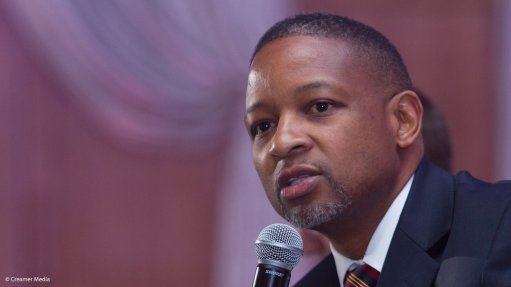
Transnet Port Terminal CEO Karl Socikwa
Photo by: Duane Daws
As State-owned Transnet prepares to deliver its financial results for the first half of this year on Thursday, Transnet Port Terminals (TPT) CEO Karl Socikwa on Wednesday vowed to do everything possible to keep the division’s balance sheet healthy as the South African economy faces low economic growth.
Speaking at a business-to-business briefing, in Rosebank, he said that, as the company was required to fund its portion of the Transnet group’s multibillion-rand Market Demand Strategy (MDS), financial stability was critical, especially in light of South Africa’s economy remaining one notch above junk status.
This emerged amid ongoing reports of mismanagement leading to bailouts and assistance from government for some State-owned entities – a drain on State resources that TPT aimed to avoid.
While the 2016 first-half financial impact of an implied slowdown in volumes owing to the weak economy was not yet revealed, TPT had posted a rise in revenue for the 2015 financial year.
Revenue increased by 13.8% to R9.7-billion owing to higher bulk and breakbulk volumes and despite flat container volumes and lower automotive volumes in the 12 months to March 2015.
Net operating expenses for the year had increased by 11% to R6.7-billion.
For the 2015 financial year, TPT posted a 20.6% rise in earnings before interest, taxes, depreciation and amortisation to R3-billion.
Socikwa, however, said he recognised that the company had inherited a significant backlog in investment, compounded by the effects of the 2008 global financial meltdown, and that, despite the renewed economic slowdown, investment needed to stay on its current correction course.
The Transnet group was funding the expansion and modernisation of rail, port and pipeline infrastructure across South Africa to promote economic growth.
TPT’s focus was not only on maintaining and expanding its infrastructure but also on investing in “soft assets”, including human resources and technology.
“We need to start thinking innovatively and not just throw money at hard assets,” Socikwa explained, pointing out the need to “up” the company’s “game” in efficiencies and competitiveness through innovation and technology, effective planning, skills and human resource development, integration and value-chain optimisation and automation and delivering a “smarter” ports structure.